|
|
 |
 |
|
Summer's Here
|
|
Posted by JVJ @ 10:25 am
|
Apr 30th : 2008
|
After four days of record temperatures the heatwave is finally abating. I was at the beach on Sunday. The air temperature was 86F and the water was 60F: quite a differential. The Pacific's cold in Southern California and it takes an entire Summer to warm it up to a balmy 72F. The photo is of the fence in my backyard. Really, there's a fence underneath all those blooms.
|
|
Taiga Madness
|
|
Posted by JVJ @ 7:27 am
|
Apr 29th : 2008
|
This photo was taken two weeks ago in the woods. It reminds me of the Birchway in A Sword From Red Ice. The trees look like bars...and I might not be able to escape.
The idea for the Birchway came in part from George St. Georgeís book Siberia which was published in 1969: ďThe taiga is like a prison. Youíre surrounded by trees and you canít see beyond them. And what would you see if you could? More trees. Billions of them, for hundreds of miles in every direction. The endlessness of it gets you, your nerves become tight as guitar strings. Some people break. They just get up and go.Ē
|
|
Odds and Ends
|
|
Posted by JVJ @ 7:30 am
|
Apr 28th : 2008
|
We had a heatwave yesterday. It was 95F at 1pm. I finally have my camera lead so I'm posting a photo I took last week as my plane was landing in San Diego. To your right youíll find a link to an interview with SF agent Simon Kavanagh whose clients include Iain M.Banks and China Mieville. If youíre serious about writing SF or Fantasy, it's well worth hearing what Mr. Kavanagh has to say: "Be yourself. Write what you love. Write in your own style. If you get rejected - keep going. Agents make mistakes. So do editors."
|
|
Epic Fantasy Quiz
|
|
Posted by JVJ @ 1:15 pm
|
Apr 25th : 2008
|
A few years back I posted an epic fantasy quiz online. Itís been pretty
popular so I thought Iíd do another one--in two installments this time
because Iím slower than I used to be. Hereís the first half. Take it and
see how much you really know about epic fantasy. The answers are at the
bottom. 
|
1. What do Tolkienís initials J.R.R. stand for?
a) John Ronald Reuel
b) Joseph Richard Reese
c) Jack Robert Raymond
|
2. What year was Terry Brookís Sword of Shannara published?
a) 1968
b) 1974
c) 1977
|
|
3. Which writer will be continuing Robert Jordanís Wheel of Time series, following Mr. Jordanís death in 2007?
a) Brandon Sanderson
b) L.E. Modesitt
c) Kevin J. Anderson
|
4. In Stephen R. Donaldsonís The Chronicles of Thomas Covenant the Unbeliever, what disease does Thomas Covenant suffer from?
a) Leprosy
b) Haemophilia
c) Narcolepsy
|
|
5. What fictional world is featured in this map (Exhibit Y)?
a) Marion Zimmer Bradleyís Darkover
b) Ursula K. Le Guinís Earthsea
c) Raymond E. Feistís Midkemia
6. How many books does George R.R. Martin project will complete his A Song of Fire and Ice series?
a) Seven
b) Nine
c) Five
|
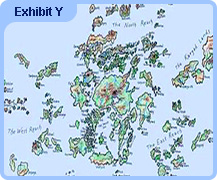
|
|
7. Disneyís animated movie The Sword in the Stone is based on the book of the same title by?
a) C.S. Lewis
b) Thomas Malory
c) T.H. White
|
8. J.V.Jonesí Sword of Shadow series features a wasteland called The Great Want. The name originated in which culture?
a) The Tuareg of the Sahara Desert
b) The Inuit of Alaska
c) The Samoyed of Siberia
|
|
9. Terry Pratchett co-wrote Good Omens with?
a) David Gemmell
b) Neil Gaiman
c) Robert Rankin
|
10. Which of these writers worked with Tolkienís son, Christopher Tolkien, on The Silmarillion?
a) Guy Gavriel Kay
b) Philip Pullman
c) Peter S. Beagle
|
|
|
Angus Lok
|
|
Posted by JVJ @ 12:07 am
|
Apr 24th : 2008
|
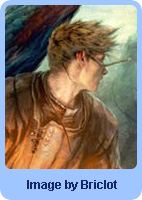
Iíve been getting quite a bit of email asking about Angus Lok. As a writer,
youíre never quite sure which of your characters will capture readers
imaginations. While I might have guessed that the Dog Lord would be
popular, I certainly couldnít have predicated that quiet and thoughtful
Bram Cormac would capture readersí imaginations.
Angus Lok has featured in
the series from the start, but never as a P.O.V character (P.O.V stands for
point of view and means that we, as readers, view the action through that
characters eyes, ears and thoughts). Iíve always thought he was
interesting--heís been witness to terrible things in his past, yet still
manages to be the most experienced, well-rounded and practical character
in the series. Thatís why the events at the end and beginning of Books II
and III hit so hard. Readers want to hear more of Angusí story. If youíve
read previous posts, youíll know that Book IV is titled Watcher of the
Dead. It might cheer you to know that Raif Sevrance isnít the only
character watching. Hereís a brief glimpse from Book IV.
Thereís a world of hurt out there, the watcher thought as he maintained
pressure on the womanís throat. Heíd seen it, heíd inflicted it, now he
lived it. The woman didnít know her luck. Live or die, it barely mattered.
She still wouldn't know her own luck.
|
|
Excerpt from A Sword From Red Ice
|
|
Posted by JVJ @ 8:18 pm
|
Apr 22nd : 2008
|

The man who had lost his soul approached the house. Timbers framing the
doorway were black and shiny. Creosote deposited during the burning gave
them the oily iridescence of ravens wings. The door that had once been
suspended between them had fallen on the front stoop. Its metal hinge pins
had popped out of their casings like cooked sausage meat. Charred panels in
the door crumbled as the manís weight came down on them. In a different
life he had stained and waxed the panels, proofing them against the brutal
winter storms that hit from the north.
Protecting this house from harm.
The man rocked backward, bringing force to bear on the heel of his left
boot, crushing the brittle wood, delaying the moment he entered the house.
When he was ready he stepped into the remains of his hallway. Fire had
burned intensely here. The interior walls had been limestone-and-horsehair
plaster, skimmed onto wood lath. His mistake had been to paint them. Oil in
the paint had accelerated the burn, working against the natural retardant
of the lime. The smoke produced would have been black and toxic. It would
have burned holes in a childís lungs.
The man did not pause. He could no longer trust himself that far. Walking
through the center of the house he passed the stairs and the black skeleton
of the stair rail. Snow had found its way in through the partially
collapsed roof and open windows, and lay in thin drifts against the risers
of each of the nine steps. The man knew snow; knew that what he looked at
was dry with age, the granules loosely packed and rolled into pellets by
the wind. Footprints stamped into the drifts held no interest for him. Men
had come later, after the house had cooled and the snow fallen. The curious
and opportunistic. Young boys on dares; thieves in search of locked boxes,
silverware, metal for scrapping; officials gathering information along with
a fine story to tell their wives over supper. The man understood the pull
of such places. Death and ruin dwelt here, and a person could come and view
it and be glad it was not his family, his house, his life.
Excerpt from A Sword From Red Ice by J.V.Jones. Artwork by Aleksi Briclot.
|
|
Reading a book by its inside cover
|
|
Posted by JVJ @ 9:19 pm
|
Apr 21st : 2008
|
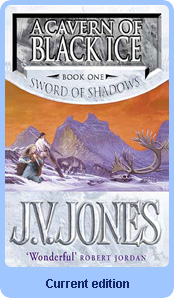
The UK edition of A Cavern of Black Ice has now gone back to press for
the 7th time. This means that previous printing runs of the book have sold
out and the publisher needs to print more.
You can tell how many times a favorite book of yours has gone back to press
by looking inside the front cover. There, along with the copyright notice,
the ISBN number, and the publisherís details youíll find the print history
given by year: 1999, 2002, 2005 (twice), 2006, etc. However, this may not
tell the whole story. The book in the photo is the fourth edition of Cavern
to be published in UK; first there was a hardback, then a trade paperback,
then a mass market paperback with a different cover (initially Orbit used
the US cover art) and then the current mass market paperback. The details
of these print runs are generally not shown as they are considered to be
different ďeditionsĒ. What you can always discover though is the year the
book was first published in any form--its first edition. This is important
information for collectors, who usually want to own the first edition of a
book.
|
|
Another day another doggie photo
|
|
Posted by JVJ @ 5:54 pm
|
Apr 20th : 2008
|
If only dogs could vote. Iíve never met a dog I didnít want my picture
taken with. I met these two goofballs while camping last year in East San
Diego County, on Mt. Laguna. Nathan, their owner, kindly snapped this
photo. It was a great trip, with wonderful people. We hiked beneath the
full moon by torchlight and stayed up late, toasting marshmallows, watching
the firelight and telling increasingly tall tales.
|
|
Schenectady
|
|
Posted by JVJ @ 07:00 pm
|
Apr 18th : 2008
|
When Harlan Ellison was asked where he got his ideas from, his answer was
Schenectady. He was commenting on the elusiveness of ideas, and the
absurdity of trying to pin them down. However, while I agree with him
entirely, I have gotten a few ideas from Schenectady in my time. And I can
be even more specific than that. Last Sunday I was in Schenectady County,
here in the Plotter Kill Preserve, on this ledge, touching the water as it
began its sixty feet drop to the creek below.
Whatís difficult to tell from
the photos is that the water has carved a bowl-like auditorium from the
surrounding rock. Standing at the base of the falls is like standing in an
amphitheater, and it struck me that if the creekís course was diverted
upstream then people could use this naturally-occurring auditorium for
meetings and war parleys and religious rites. It would make a fine outdoor
temple. If I were to use the drained waterfall in a story I would name it
Waterfell. It would be long since abandoned. And the water, diverted
centuries earlier, would be slowly trickling back.....
|
|
Book of Words
|
|
Posted by JVJ @ 12:03 am
|
Apr 18th : 2008
|
We never sleep at jvj. Bedtime in California is sunrise in Liverpool: one
of the Joneses is always on the job. Which is strange really, as weíre a
pretty lazy lot. But I digress. Paulís been busy once again, spontaneously
building a new section for The Bakerís Boy. Iím really pleased itís up
and running, and I hope youíll pop over and check it out. Tavalisk has his
own section, and Melli is still M.I.A. For those of you who are technically
advanced, The Bakerís Boy, A Man Betrayed and Master & Fool are now
available as Kindle downloads at amazon.com. The physical books can still
be found or ordered in/from your local bookstore.
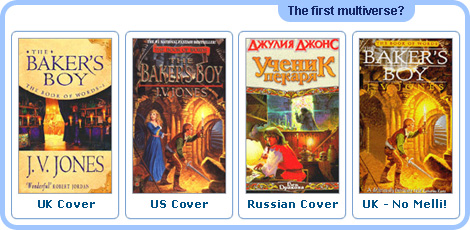
A question that frequently crops up in email is: What characters from the
Book of Words will appear in Sword of Shadows? Now you know I canít answer
that specifically--it would constitute a violation of the Writerís
Disclosure Act--but I can say a few things generally. First and foremost:
both series are self-contained. No knowledge of the Book of Words is
necessary for reading Sword of Shadows. Anything you need to know is
explained along the way. I liken the link between the two series to the
bubbles of multiverses in string theory: they touch, and one may spring
from another but no one is sure when, where or how. Second, and bearing the
first point in mind, expect little. That way youíll either be pleasantly
surprised or neutrally unsurprised. Writing Gods forgive me: thatís one
seriously ugly sentence.
|
|
Overseas Editions
|
|
Posted by JVJ @ 12:27 am
|
Apr 17th : 2008
|
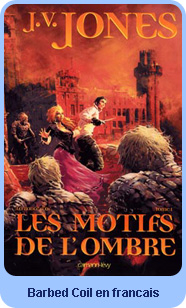
The French edition of The Barbed Coil is being published this month by
Calmann Levy. It's titled La Ronce d'Or, which translates as The Gold
Thorn. It's being split into two books, the first of which is subtitled Le
Motif De l'Ombre, which translates as Patterns of Shade. European editions
of English books are frequently split in two as the text often grows in
translation, sometimes as much as forty percent. Most of my German editions
have been split in two, along with some editions from the Netherlands and
Spain.
The decision whether or not to split a book into two volumes is made by the
publisher. The writer has no say in the matter. Itís purely a decision
about cost. Publishing a thick-as-a-brick paperback is expensive. The paper
and binding costs are considerably higher, yet the publisher cannot pass
along these increased costs to consumers as the majority of mass market
paperbacks share the same price point. So in order to make profit,
publishers often decide to split the original book in two. While the
production costs for two regular-size books are higher than one super-size
book, the combined profits will be higher too. The downside to the
publisher is increased financial risk. When they make the decision to split
a book into two volumes they commit to publishing two separate books. Two
pieces of cover art must be commissioned, two books designed, cast-off,
typeset, and put into production. Itís not a decision publishers make
lightly.
|
|
Still Recovering
|
|
Posted by JVJ @ 11:11 am
|
Apr 16th : 2008
|
Still pretty tired after the flight yesterday. 12 hours on the road, awake
at 2:45 am. My connection was through Philadelphia, a city Iíve visited
twice; once looking for R&B vinyl, and once for a booksellers expo. It
reminds me of my hometown, Liverpool. Wonderful old buildings, heavy
industry including oil refineries on the river, great music, rich history,
and a downtown thatís constantly evolving. Liverpool and Philadelphia face
each other across the Atlantic too--maybe they should be twinned cities.
No photos of Philly today (I have no way of transferring the photos on my
camera onto my hard drive) so I thought Iíd keep up this monthís animal
theme by posting this from my trip to the U.S. Virgin Islands. It was taken
in the back alleys of St. Thomasí capital, Charlotte Amalie. I really need
to get a doggie. I spend way too much time taking photos of other peopleís
doggies.
|
|
Back on the West Coast
|
|
Posted by JVJ @ 2:50 pm
|
Apr 15th : 2008
|
Iím back in San Diego, following a long and tiring flight. Biggie rode
shotgun, if you can call being crammed in the space under the seat in front
of me while mildly drugged on kitty-tranquilizers and confined to a small
brown bag riding shotgun. I left my camera lead in NY so no new photos for
a couple of days. However, I offer this one I took last week.
|
|
Vote for your favorite fantasy
|
|
Posted by JVJ @ 1:27 pm
|
Apr 11th : 2008
|

Locus is the trade magazine for SF and Fantasy. They are currently running
a poll for the best SF and Fantasy published in 2007. Anyone, anywhere can vote,
you donít need a subscription (simply leave the box blank) and you can
enter the name of any book or story you enjoyed that was published in 2007.
A Sword From Red Ice isnít on their recommended list but you can still vote
for it in the BEST FANTASY NOVEL category, just type the title in the handy
box provided on the right. By an even more staggering oversight my editor
Jim Frenkel fails to appear in the BEST EDITOR category. If you feel moved,
go ahead and give him a thumbs up too. Remember if it wasnít for Jim, Book
IV would be called Runes Writ in Yellow Ice. There's only 5 days left.
Thanks, and have fun voting.
|
|
Naming Names Part II
|
|
Posted by JVJ @ 6:20 pm
|
Apr 10th : 2008
|
SF and fantasy names can be tricky. A writer makes up a world, including all the
attending details of history, geography, culture, religion, economics and
so on, and designs a nomenclature (naming scheme) around it. As the world
has been created from scratch, many writers believe that their names should
be original too. Hence the proliferation of A'hgnks, Dariyonas, Eliialls
and Quorns. It's hard to make up names from scratch: try it. You'll end
up with some very silly names that you can pronounce (because you made them
up) but when typed on a piece of paper and handed to a stranger will only
cause him to shake his head and say, "Corn?" when you really meant
Kworn but spelled it "Quorn" because dammit it looks better, more like
a proper fantasy name.

This approach doesn't work for me. I don't want readers wondering how
to pronounce a character's name: it's an unnecessary hurdle, inhibiting a
reader's involvement with the story. I want readers to scan a name,
understand how to pronounce it, remember it, and gain a few bytes of
information relevant to that character's personality. Names like A'hgnks
and Quorns fail miserably here. If a reader is unsure how to pronounce a
word he'll skip over it in his mind, and he'll keep skipping over it
until he reaches the final page. When he should be reading, "Kworn was
lonely after the wedding" he is in fact reading, "[missing data] was
lonely after the wedding." This is a grave error for a writer to make. It
distances the reader from the character and therefore the story, working
directly against your purpose as a writer which should be to immerse the
reader in your world.
Second. A'hgnks and Quorns are hard to remember. They're new to the reader,
include unfamiliar groupings of vowels and consonants, and don't look
like words we use on a daily basis. For a reader to remember them he must
make a special effort, either take a mental snapshot of the new word so
that when he encounters another unknown word he can compare its profile to
the original. Or he has to perform a little pairing program: search his
mind for a similar word and then store the new word close by. Thus A'hgnk
might be linked to "ankh" or "high jinx" or the pirate cry, "Aaargh!"
Which brings us to the third point. When you give a character an
unpronounceable and unfamiliar name you lose control of the information
associated with that name. Quorn might sound grand to you, king-like
almost, but if the reader is pronouncing it "Corn" then he and you are
no longer on the same page. Corn is plain and straight and drinks beer,
whereas Quorn (when pronounced correctly by the writer) is regal and tricky
and likes wine. Worse even than misinformation is lack of information. If a
reader is skipping over a name in your story then he's not gaining
information from it. Valuable data is missing. You might have an elaborate
naming scheme, whereby all letters after the third apostrophe donate clan
lineage, the first vowel designates sex and the fourth names the village of
birth, but if a reader is skipping a name he's not appreciating any of
this. And as a writer you've missed an opportunity to set that character
in the reader's mind.
So if you are writing SF or fantasy, how do you name characters? Certainly you
want the culture of your world to be reflected in its names, but the need
for otherworldliness should be balanced by practicality. If you're
writing in English, anglicize your names. Thus the Celtic Bairrfhionn
becomes Berrin, the Arabic Ruqayyah becomes Kaya, and (as in my fifth book
Cavern of Black Ice) the Inuit Sadluiyok becomes Sadaluk.
If we do this we manage to retain some of the richness and culture of the country
of origin while creating a pronounceable word.
Another trick is to use existing words as names. In Fortress of Grey Ice I
introduce a character named Stillborn. It's a word we all know, has a
small but emotionally-charged packet of information attached to it, and now
that you've seen it in this context: doesn't it look like a name?
Collect words. Animal names, bird names, fish names, emotions, nouns,
legumes. In my Sword of Shadows series, I have a character who appears
just once, in the prologue to Fortress. He has a small part but it's an
important one and I needed to convey character without wasting words. A few
weeks earlier I'd been watching the Tonight Show when Jay Leno introduced
the professional boxer known as Butterbean. Butterbean looks just like his
name: plump, hairless, pale. And he's a goodwilled softie too, which is
also conveyed in his name, most specifically the "butter" part. My
character however is not a goodwilled softie, though he is plump, hairless
and pale. My character is mean and has a giant chip on his shoulder. My
character's name is Bitterbean.
Modifying existing words is a an excellent strategy for SF and fantasy
writers. It's a way to produce new words that have all the familiar
markers of existing words. Start collecting words, jot them down and refer
to them when you're naming characters. For as long as I can remember
I've collected words. Way back in the eighties, I used to play a game on
the Commodore 64 where the entire purpose--as I remember it--was to reach
the obelisk. "That's a good word," my teenage self thought, filing it
away for future use, even though Teenage Self never imagined she would
become a writer. Over a decade later I used that word to name a character
in my first book, The Baker's Boy. Obelisk
became Tavalisk and a sneaky archbishop was born.
Once you get into the habit of looking at everyday words as names, you see
potential everywhere. Modified or unmodified, they're familiar and bring
information to readers. Perhaps Corn, plain and simple, wouldn't be such
a bad name after all. And then there's Buckwheat and Hayseed, Chickenfeed
and Chickpea. Oatmeal might become Goatmeal, and Fodder...well Fodder's
just good to go.
If you choose carefully, you can still add the richness of languages other
than English to your names. Obelisk is Greek in origin, but as it's in
English use we know how to pronounce it. If I modified the Greek word for
tower, Ypsonomai, to Kipsonomai, most of us would still be unsure how to
pronounce the new word and we'd do a skipover. However, if we take the
Arabic word Saffron, which is in everyday English use, and modify it to
make Saffril, then we not only get a pretty girl's name with a golden
preciousness to it, but we also get a name that reaches back to a different
culture.
So get a notebook and start filling it with words you like. Keep your eyes
and ears open. Watch the Tonight Show and the Discovery Channel. Read. Flip
open a dictionary at random and make a name from the fifth word down. Get
into the habit of looking at everyday words as potential names. Shorten,
anglicize and simplify names from languages other than English. Use
non-English words in common use as a starting point for unusual and
culturally-rich names. Avoid apostrophes. Utilize the meaning of common
words to describe character: Pip, Sparrow, Stillborn, Bear, Corn. Most of
all make sure you choose words that are pronounceable. [missing data] does
not make for a good name.
|
|
Animal House
|
|
Posted by JVJ @ 5:18 pm
|
Apr 9th : 2008
|
Itís turning into animal month at jvj. This is the doggie I took walking on
Sunday on the banks of the St. Lawrence. As you can see he was a very bad
boy. He wasnít supposed to go in the water. I hollered. He went in. I
jumped up and down on the bank. He stayed in. I told him he was bad. He
wagged his tail. That water was pretty cold, btw. Barely above freezing.
Doggie was very smelly afterwards. Doggie enjoyed being told he was smelly.
|
|
Thousand Islands
|
|
Posted by JVJ @ 5:35 pm
|
Apr 8th : 2008
|
This weekend I drove up to Canada, to Kingston Ontario, which is located on
Lake Ontario where it runs into the St. Lawrence. Kingston was once
Canadaís capital and has been settled since 1673. Downriver, is one of the
prettiest regions in all of Canada and the US, the Thousand Islands. As you
drive over the bridge north of the border you look out into an enchanted
world of tiny islands thick with lush green pines set in deep blue water.
It sets your imagination running. You think, this would make a perfect
setting for a book...
Paul has been busy behind the scenes in the jvj labs, building--not a
better website--but a more connected one. We are now a blip on the
blogosphere radar. We can be digged and mixxed, facebooked and generally
shared with the rest of civilization. World domination cannot be far
behind. To take part in this exciting new development, click on the SHARE
button underneath this--and every subsequent--journal entry.
|
|
Bits and Pieces
|
|
Posted by JVJ @ 4:50 pm
|
Apr 4th : 2008
|
Itís good to see folk are reacting favorably to Book IVís title, Watcher of
the Dead. It took a while percolating. After three books with ďiceĒ in the
title, how wise is it to stray from the format? Will readers realize
Watcher is part of the same series? I think they will. And as a few people
on the messageboard have pointed out: How far can we go with ice of
different colors? Certainly not yellow, as my editor, Jim Frenkel, once
warned.
I offer this photo as proof that I donít keep Biggie in a small bag all
day. It was taken yesterday in the woods.
To your right youíll find a couple of links. The first is to Irene Galloís
blog. Irene is the art director at Tor, and here she describes the process
of choosing between traditional SF&F covers and more mainstream covers. The
second link is to a NY Times article on tinnitus. Before
writing The Barbed Coil I
learned a lot about tinnitus, and itís good to see a growing understanding of this disorder.
|
|
Everton FC
|
|
Posted by JVJ @ 7:21 pm
|
Apr 3rd : 2008
|

So the Derby was played on Sunday. Liverpool vs Everton. Liverpool won,
1-0. The result of this yearís installment of the long-running friendly rivalry has moved
Liverpool further ahead of Everton in the Premier League (the gap is now 5 points).
As a longtime Everton fan Iím okay with this. Itís the Everton way: get
as close as you can to victory without actually attaining it. We wouldnít know what to
do with ourselves if we actually won. Itís been a long while. Weíve forgotten.
When we were kids, Mum worked in a gas station and sometimes weíd hang out
there after school. These were the days when gas companies gave out small
gifts at the pump to keep customers loyal. Records, Green Shield Stamps and
soccer cards were just some of the bounty. Paul and I used to raid the
soccer cards (equivalent to US baseball cards) in search of Everton
players, most especially Alan Ball who was the star midfielder for Everton
in the late 60s and early 70s. Sadly Ball has passed on now.
|
|
Journal
|
|
Posted by JVJ @ 10:20 pm
|
Apr 2nd : 2008
|
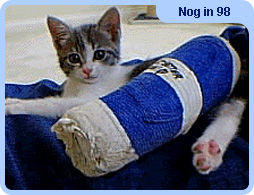
The journal in its current form is officially a year old. In a previous
form, as JVJ News, it went from 1998-2003, so in another sense itís ten
years old. Because we never throw out anything here--even the really bad
stuff--you can still read those old posts. Iíve long since lost the
physical photo of Nog and her giant blue cast, but itís always on the News
page when I need it. That cast was bigger than she was. Literally. No
exaggeration. Judge for yourself.
|
|
Last Day of Winter?
|
|
Posted by JVJ @ 6:15 am
|
Apr 1st : 2008
|
Sunday was lovely here, sunny and crisp and just above freezing. Fresh snow
made the woods sparkle. If you looked really closely at the tips of twigs
you could see the leaf buds unfurling. Scanning ahead at the weather
forecast, it just might have been the last true day of Winter.
As itís April the first, I thought you might enjoy this little piece from
the archives. ďWe could have stayed aloft for another day,Ē complained
Piccard, ďif Brian had only agreed to burn Cavern for extra fuel.Ē
|
|
 |
 |
 |
 |
|
|